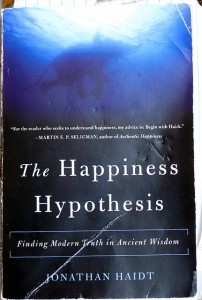Comprehensive moral instruction
We've all seen many Internet lists offering suggestions for improving one's life or state of happiness. This list, by a young man named Henrick Edberg at The Positivity Blog, caught my attention today, perhaps because it includes some of my own favorite bits of productivity reminders and folk wisdom, including the "80/20 rule" and the advice to not beat yourself up for making mistakes. His list also includes a nice twist to the golden rule: Give value to get value, not the other way around. Another item on his list reminds us to express gratitude to others in order to enrich our own lives, reminding us that expressing gratitude is socially contagious. What also intrigued me was Edberg's pre-list commentary: He laments that the nuggets of advice in his list aren't taught as part of the high school curriculum.
But I still think that taking a few hours from all those German language classes and use them for some personal development classes would have been a good idea. Perhaps for just an hour a week in high school. It would probably be useful for many students and on a larger scale quite helpful for society in general.
I think I know why there are no such classes in public schools. Teaching advice on how to navigate through the complexities of life in a positive state of mind would too often trigger discussions regarding "morality," which too often trigger discussions of specific religious teachings which, in turn, tend to anger at least some parents and students, which would then shut down the course (in public schools, anyway). I suspect that this causal chain is a big reason that so many schools tread lightly on teaching students how to navigate through life, even though there is an immense amount of information that needs to be discussed. Instead of vigorously teaching what the students need to know to be functional and virtuous, most schools ostensibly defer to families and churches (though they actually defer at least as much to pop culture, including magazines, "news" programs, television shows and movies) to fill that "moral" vacuum of students. In America, however, even "serious" teachers of morality often insist that the way to best live one's life is by obeying a standardized set of "moral" rules. Is the advice to follow any set of rules really the best approach for instructing us how to get along with each other down here on planet Earth? Is it even possible for any form of obedience to serve as the foundation for a high-functioning society? I think not. I'm going to digress at this point . . . [more . . . ]

